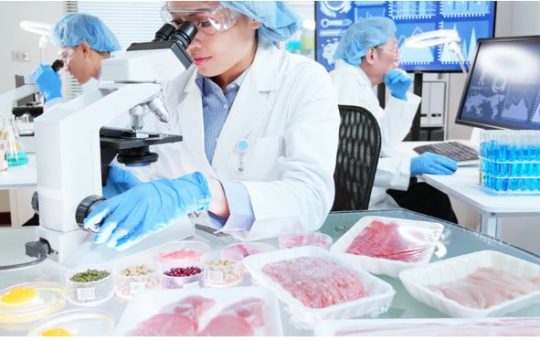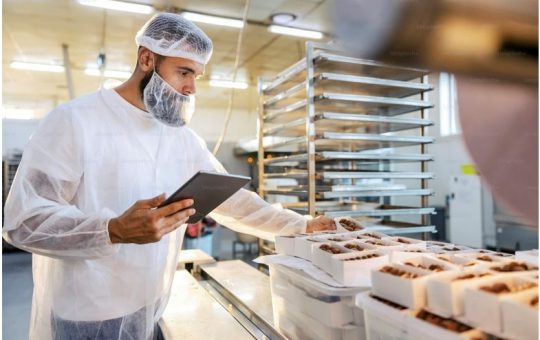
Level 2 FOOD SAFETY ON SHIPS AND VESSELS
Level 2 Food Safety on Ships and Vessels:
Course Overview:
The Level 2 Food Safety on Ships and Vessels course is designed for individuals working in food handling and preparation roles aboard ships or vessels. This qualification covers essential food safety practices, hygiene regulations, and the specific challenges faced when handling food at sea. It ensures that food handlers and supervisors on board are equipped with the knowledge to maintain high food safety standards and prevent contamination while working in a maritime environment.
Benefits:
- Compliance with Maritime Food Safety Regulations: Ensure that food safety standards are met on ships and vessels, in line with international and maritime regulations.
- Enhanced Knowledge and Skills: Equip yourself with essential food safety knowledge specific to the maritime environment.
- Safe Food Handling Practices: Learn to implement safe food handling procedures to reduce the risk of foodborne illnesses among passengers and crew.
- Career Opportunities in the Maritime Industry: This qualification enhances employability in the maritime food service sector, opening up roles in cruise lines, ferries, and other vessels.
Learning Outcomes:
By the end of the course, learners will be able to:
- Understand food safety principles specific to the maritime environment.
- Identify potential food safety hazards, including biological, chemical, and physical risks.
- Implement appropriate food handling, storage, and preparation techniques to prevent contamination at sea.
- Ensure compliance with international food safety regulations for ships and vessels.
- Apply proper hygiene standards, including personal hygiene, for food handlers on board.
- Recognize the importance of cleanliness and sanitation in food preparation and storage areas on ships.
Study Units:
- Introduction to Food Safety on Ships and Vessels
- Overview of food safety and the importance of food hygiene at sea.
- Regulations and requirements for food safety on ships and vessels.
- Understanding Food Safety Hazards
- Biological, chemical, and physical hazards in food handling on ships.
- Identifying risks related to the maritime environment and how to manage them.
- Food Storage and Temperature Control
- Correct food storage methods to avoid contamination and spoilage.
- The importance of temperature control in food safety, including freezing, refrigeration, and cooking.
- Safe Food Handling Practices
- Personal hygiene for food handlers on board vessels.
- Preventing cross-contamination during food preparation, cooking, and service.
- Cleaning and Sanitation
- Effective cleaning procedures for kitchen and food storage areas on ships.
- Sanitizing surfaces, equipment, and utensils to maintain food safety.
- Food Safety Management Systems and Monitoring
- Implementing food safety management procedures onboard.
- Monitoring food safety practices and ensuring compliance with regulations.
- Health and Hygiene Regulations in Maritime Settings
- Understanding maritime-specific health and hygiene regulations.
- Legal responsibilities of food handlers and supervisors on ships and vessels.
Career Progression:
After completing the Level 2 Food Safety on Ships and Vessels qualification, you can progress to various roles in the maritime and hospitality industries, such as:
- Ship’s Chef/Cook: Prepare and serve food safely in accordance with maritime food safety regulations.
- Catering Supervisor/Manager on Ships: Oversee food safety and hygiene practices within the food service department on board.
- Food Safety Officer on Vessels: Monitor food safety procedures on ships, ensuring compliance with food safety management systems and regulations.
- Cruise Line Hospitality Manager: Manage food service operations on cruise ships, ensuring high food safety standards.
- Environmental Health Officer (Maritime): Ensure that food safety protocols are maintained across vessels and comply with maritime safety standards.
This course is ideal for those working in food handling, preparation, and service aboard ships and vessels, providing a strong foundation in food safety specific to the maritime environment.
Our assessment process is designed to ensure every learner achieves the required level of knowledge, skills, and understanding outlined in each course unit.
Purpose of Assessment
Assessment helps measure how well a learner has met the learning outcomes. It ensures consistency, quality, and fairness across all learners.
What Learners Need to Do
Learners must provide clear evidence that shows they have met all the learning outcomes and assessment criteria for each unit. This evidence can take different forms depending on the course and type of learning.
Types of Acceptable Evidence
Assignments, reports, or projects
Worksheets or written tasks
Portfolios of practical work
Answers to oral or written questions
Test or exam papers
Understanding the Structure
Learning outcomes explain what learners should know, understand, or be able to do.
Assessment criteria set the standard learners must meet to achieve each learning outcome.
Assessment Guidelines
All assessment must be authentic, current, and relevant to the unit.
Evidence must match each assessment criterion clearly.
Plagiarism or copied work is not accepted.
All learners must complete assessments within the given timelines.
Where applicable, assessments may be reviewed or verified by internal or external quality assurers.
Full learning outcomes and assessment criteria for each qualification are available from page 8 of the course handbook.
Top Courses
No results found.
Related Courses
Let's Get in touch
Deleting Course Review
Course Access
This course is password protected. To access it please enter your password below:



